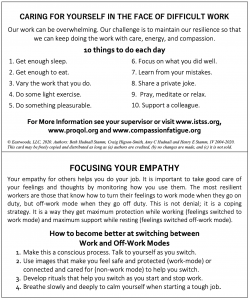Compassion Satisfaction and Compassion Fatigue: Helpful tips for our Frontline Workers

Frontline workers have been showing up and working hard to provide the best service possible in these trying times. Many are feeling the effects of their hard work, both positively and negatively. We are seeing strong trends of both compassion satisfaction and compassion fatigue. Compassion satisfaction is essentially “the good stuff” or the positive aspects of helping, while compassion fatigue is “the bad stuff” or the negative aspects of helping.
Let’s talk about the good stuff. Compassion satisfaction is the pleasure and satisfying feeling that comes from helping others. Many people enter these types of fields because they have empathetic attitudes for others difficulties as well as a strong desire to assist in alleviating the difficulties. They are providing healing, encouragement, and support to others who are facing anguish. Examples of these professions include: doctors, nurses, health care workers, pharmacists, teachers, paramedics, police, operators, therapists and many more professions that have continued to attend to their jobs day to day during all that is going on in our world. Compassion satisfaction is coming home from work feeling good about the work we did and spreading the positivity and encouragement of ongoing work life.
Now the hard stuff: compassion fatigue. When workers are faced with constant exposure to stress and traumatic experiences this can contribute to a feeling of reduced job satisfaction. Remember above we said frontline workers are empathetic? That means whether dealing with good or bad, they are connected to the feelings that others are experiencing. More often than not, especially now, frontline workers find themselves walking alongside more difficult situations, more uncertainty, and less outlets to release those feelings. They are stored within and taken past the time when the job is done. This can lead to both compassion fatigue which in turn can lead to burnout and vicarious trauma. Burnout is the physical feelings of exhaustion, emptiness, and inability to cope with work demands. Vicarious trauma is the emotional residue that is left after working in difficult situations.
It is important to be aware of the symptoms of compassion fatigue. Some of them include:
- Feeling angry, irritable, or tense
- Reduced empathy towards others
- Limited tolerance for stress

- Changes in your belief system
- Reduced sense of accomplishment
- Difficulty concentrating on your job duties
- Difficulty sleeping
- Nightmares and flashbacks
- Increased isolation
- Poor coping
- Conflict in relationships
- Self-blame for situations out of your control
Many frontline workers frequently tell themselves that they are strong and this will pass, which can be true, but help may be needed. It’s often difficult for a helper to seek help. It’s important to know that it’s okay to not be okay. Reaching out for help could be the best thing for front-line workers who are struggling right now.
Beth Hudnall Stamm, PhD, developed a pocket card about caring for yourself in the face of difficult work during the current COVID-19 health crisis. See below:

When working towards resiliency and compassion satisfaction it is important to remember what we do have. The Compassion Fatigue Awareness Project has developed a Caregiver’s Bill of Rights that are a great reminder.
The Caregiver’s Bill Of Rights
I have the right……
- to be respected for the work I choose to do
- to take pride in my work and know that I am making a difference
- to garner appreciation and validation for the care I give others
- to receive adequate pay for my job as a professional caregiver
- to discern my personal boundaries and have others respect my choices
- to seek assistance from others, if and when it is necessary
- to take time off to re-energize myself
- to socialize, maintain my interests, and sustain a balanced lifestyle
- to my own feelings, including negative emotions such as anger, sadness, and frustration
- to express my thoughts and feelings to appropriate people at appropriate times
- to convey hope to those in my care
- to believe those in my care will prosper in mind, body, and spirit as a result of my caregiving
Please see their reading on In Time of Crisis for suggestions on lowering compassion fatigue levels.
If you feel you may be experiencing compassion fatigue, it is important to reach out for help. Talk to your employer about the stress of your job and how it is impacting your work. Talk to your family, so they are aware. Seek professional guidance from trained professionals on how to overcome compassion fatigue. The work you do is very valuable and you are needed and appreciated.
Written by: Meaghan Lightbody – Warner, LCSW